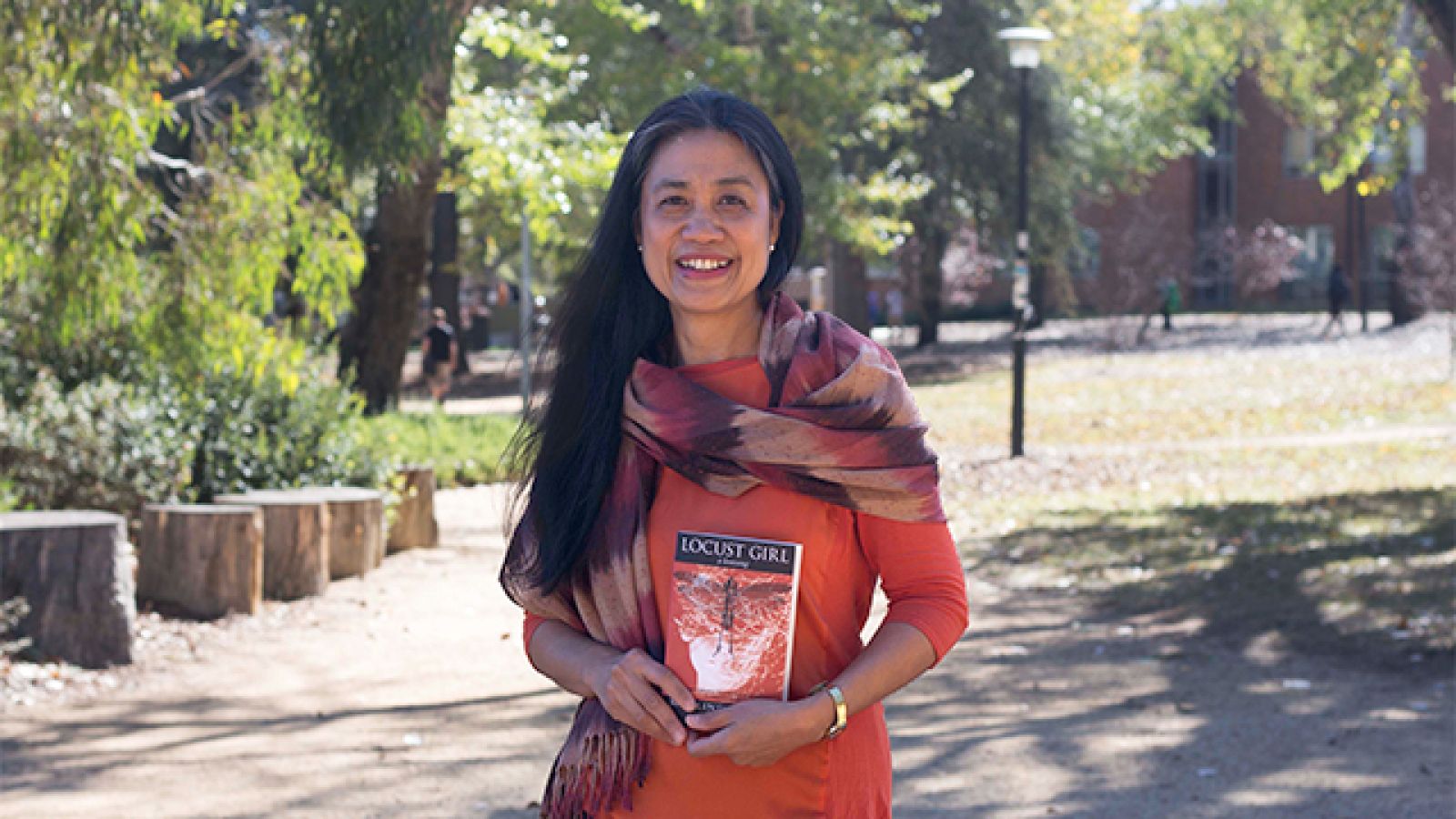New ANU lecturer shortlisted for NSW Premier’s Literary Awards

Dr Merlinda Bobis with her book Locust Girl. A Lovesong.
A recently appointed ANU Honorary Senior Lecturer in Creative Writing has been shortlisted for the New South Wales Premier’s 2016 Literary Awards.
Dr Merlinda Bobis, who describes herself as a novelist, poet, performance artist and academic, has been shortlisted for the Christina Stead Prize for Fiction category of the awards for her novel Locust Girl. A Lovesong. Fellow shortlisted authors are Tony Birch, Gail Jones, James Bradley, Lisa Gorton and Mireille Juchau.
Merlinda says she is thrilled with the news and calls her fellow nominees an ‘excellent line-up.’
‘The writers are people I admire,’ she adds.
Locust Girl is a ‘political fairy tale’ that was initially a response to former US President George W Bush’s remarks during his “War on Terror”.
‘I conceptualised the novel as a response to Bush saying, “You are either with us or against us”,’ Merlinda says.
‘And the border was so clear-cut. These are the anti-terrorists, these are the terrorists. People thought in binary terms. I worried a lot. And I thought, if you are not in either camps, where are you?’
Merlinda’s writing is influenced by her upbringing, having grown up in the Philippines in an environment of great instability.
‘Our city Legazpi is between the Pacific and this active volcano, Mayon,’ Merlinda says.
‘We’re in a volcanic belt, earthquake belt, typhoon belt. We’re always used to having disasters happen, so we have this local saying about ourselves: nabubuhay sa tagilid na daga — we live on tilted earth.’
During her early teens, the Philippines came under martial law.
‘In my high school, some students were taking up arms in protest,’ Merlinda begins.
‘The violence… we always had that in our landscape. That uncertainty that anything can happen and the awareness of violence, whether it’s in nature or politics … it’s interesting piecing it all together in my head.
‘So politics is always there in my works, whether they’re about poverty, globalisation, terrorism, food security, or movement of peoples in the context of geopolitics. And Locust Girl brings all these issues together in relation to climate change.’
Merlinda likens her new novel to a fable in the Orwellian tradition. At its heart is a friendship between two girls who live in a world divided by the haves and have-nots, where all the main resources are controlled by a central entity called the Five Kingdoms.
‘We all know that the world’s wealth is controlled by a very small percentage of the population. The book is like a lesson, in the tradition of fables,’ Merlinda explains.
‘It’s a warning. It’s post-apocalyptic. But then I thought, it’s already happening. For many people around the world, they’re already in this stage. The walking to the border. The hunger. Whether it’s in Africa, the Middle East, Asia.
The Filipino tradition of oral storytelling is richly evoked in Locust Girl, which is interwoven with short songs.
‘When I launched it, I sang the songs,’ Merlinda says.
‘I really think of the book as my love song to the world. From whichever side of the border you are on.’
Merlinda, who has just begun her three-year appointment, will be working on a number of projects including adapting Locust Girl into a screenplay.
The winners of the New South Wales Premier’s Literary Awards will be announced on 16 May.